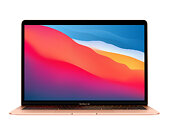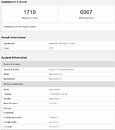Thursday, November 12th 2020

Apple's M1-Based MacBook Air Benchmarked
When Apple announced that they are going to switch their Mac lineup from Intel-based x86 processors to the custom "Apple Silicon," everyone was wondering how the new processors will look and perform. To everyone's luck, Apple has just a few days ago announced its first Apple Silicon custom processor for MacBook. The M1, as the company calls it, is their first processor designed for higher-power and performance tasks The M1 features eight CPU cores (four high-performance and four-high efficiency) paired with eight cores dedicated to the graphics. On the die, there is also a 16-core neural engine made to accelerate machine learning tasks found in the new applications.
Today, we are getting the first GeekBench 5 CPU benchmarks that showcase just how far Apple has come with its custom design. What we have is the M1 processor found in MacBook Air. This Mac model features a passive cooling system, cooling a CPU with a base frequency of 3.2 GHz. The system scored 1719 points in the single-core result, and 6967 points in the multi-core result. The single-threaded results measure itself with some of the highest-end offerings from Intel and AMD, while the multi-threaded results are very good given the mix and match of small and big cores.
Source:
GeekBench 5
Today, we are getting the first GeekBench 5 CPU benchmarks that showcase just how far Apple has come with its custom design. What we have is the M1 processor found in MacBook Air. This Mac model features a passive cooling system, cooling a CPU with a base frequency of 3.2 GHz. The system scored 1719 points in the single-core result, and 6967 points in the multi-core result. The single-threaded results measure itself with some of the highest-end offerings from Intel and AMD, while the multi-threaded results are very good given the mix and match of small and big cores.


117 Comments on Apple's M1-Based MacBook Air Benchmarked
I'm not saying it's a bad chip, it seems very promising and Apple made some very bold claims. But c'mon.
But i like it, that Apple makes now a real golden cage.
Give us some benchmarks worth shit, I couldn't care less how fast it is for opening browser I actually do real work. If this thing can run Matlab, Mathematica, Comsol, Ansys etc faster than any x86 or close at such low power and sustain that performance when getting hammered all day, then sign me up. But unless I can have a discrete GPU for CUDA it won't happen. How many years before we get discrete GPU's and drivers for ARM architecture in any new age Apple computer. It will only be a matter of time before the desktops also dump x86.
The image shows the M1 in the air at 3.2Ghz scores 1739.
The best score I could find for the 10900 (max boost single thread is 5.2Ghz) is 1535.
In other words the performance gains are mostly over for them, they wont be able to make much wider designs or higher frequency. I guess that's why they decided to make the jump now, otherwise in the future their chips are going to look less and less impressive.
You ? Fuck all, at the moment, you just keep repeating "back up your claims" and nothing else like an actual idiot. I already wasted enough time with you, off to the ignore list you go.